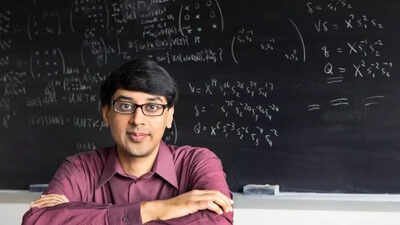At first glance, Manjul Bhargava’s story reads like that of many Indian-origin overachievers in the academic world. But look closer, and his journey reveals a rare blend of intellectual brilliance, deep cultural grounding, and boundary-breaking curiosity. From mastering high school mathematics by the age of 14 to winning the Fields Medal, the most prestigious prize in mathematics, Bhargava has followed an educational path that is both elite and deeply personal.
A childhood steeped in math and music
Born on August 8, 1974, in Hamilton, Ontario, to Indian parents, Bhargava grew up in Long Island, New York, where his mathematical talents became evident early. His mother, Mira Bhargava, a mathematics professor at Hofstra University, was his first teacher. She introduced him to mathematical ideas not just through textbooks, but through puzzles and patterns.By age 14, Bhargava had completed his school’s full curriculum in math and computer science. But he wasn’t just a numbers kid. He also studied tabla under masters like Zakir Hussain and learned Sanskrit poetry from his grandfather, Purushottam Lal Bhargava—experiences that shaped his uniquely creative and interdisciplinary way of thinking.
Harvard : Where talent met opportunity
After graduating as valedictorian from Plainedge High School, Bhargava went on to Harvard University, where he earned his AB in mathematics in 1996. Harvard gave him not only academic rigor but also the freedom to explore advanced mathematical research as an undergraduate.His work during this time was already groundbreaking. He discovered new mathematical structures and submitted original research, earning him the 1996 Morgan Prize—the highest award for an undergraduate in mathematics in North America.
Princeton: The place that shaped his research identity
Bhargava pursued his PhD at Princeton University, where he studied under Sir Andrew Wiles, famed for solving Fermat’s Last Theorem. This period proved transformational. His doctoral thesis, Higher Composition Laws, reimagined 200-year-old ideas from Gauss and offered powerful new tools in number theory.Bhargava’s work during his PhD not only earned widespread academic acclaim but also set the foundation for a career filled with pioneering discoveries. Princeton recognized his brilliance early and appointed him a tenured full professor by age 29—an extraordinary milestone in academia.
A career defined by curiosity and creativity
Bhargava’s post-doctoral years were marked by rapid-fire breakthroughs. He developed 14 new composition laws, offered new proofs of classical theorems like the 15 and 290 Theorems, introduced the Bhargava factorial, and co-authored proofs that advanced the understanding of elliptic curves—key to both pure mathematics and cryptography.In 2014, he received the Fields Medal for “developing powerful new methods in the geometry of numbers.” The award confirmed what the math world had long known: Bhargava was not just a gifted problem-solver, but a thinker capable of reshaping entire domains.
Bridging worlds: India, the West, and everything in between
Although based at Princeton, Bhargava maintains strong ties with India. He holds adjunct appointments at the Tata Institute of Fundamental Research, IIT Bombay, and the University of Hyderabad. His work reflects a global perspective—rooted in Indian tradition, shaped by American education, and respected across continents.He served on the Padma Awards Committee in 2023, highlighting his growing role in shaping Indian scientific policy and recognition.
What students can learn from Bhargava’s path
Manjul Bhargava’s life is a lesson in how education is not just about prestige—it’s about passion. From Harvard’s lecture halls to Princeton’s research labs, what carried him forward was not just intelligence, but the joy of exploration. He blended disciplines, embraced his heritage, and never lost his sense of wonder.For students in India and across the globe, Bhargava’s path is an inspiring reminder: deep curiosity, nurtured by strong mentorship and an open mind, can lead not only to personal success but to discoveries that change the world.TOI Education is on WhatsApp now. Follow us here.






